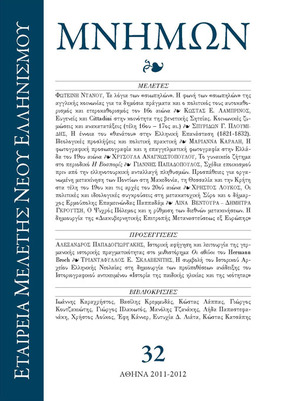Το παλαιοημερολογίτικο ζήτημα (1924-1952) : όψεις της πολιτικής και πολιτισμικής σύγκρουσης στο μεσοπόλεμο και στη μεταπολεμική περίοδο
Part of : Μνήμων ; Vol.22, 2000, pages 135-169
Issue:
Pages:
135-169
Parallel Title:
The Issue of the Old Calendar (1924-1952) : Views of the Political and Cultural Conflict during the Interwar and the Post Civil War Period
Section Title:
Articles
Author:
Abstract:
The aim of the current study is an attempt to address the problem which emerged in the Hellenic Society during the years of the inter war as well as the first post civil war period, due to the change of the calendar. The introduction, from the Hellenic Church, of the new (Gregorian) calendar in 1924 created a strong reaction among the believers wich resulted to the creation of a new movement, named Greek Religions Community of Genuine Orthodox Christians (C.O.Ch.). This conservative minority, having had a great influence, insisted in the reinstatement of the old calendar and caused important conflict in the Hellenic society. The issue is examined from a political viewpoint, since the G.O.Ch. functioned as a pressure group towards the governments, demanding the free exercise of their religious duties. The governments appeared rather uncourageous in facing the problem, as they relied on G.O.Ch's vote. However, there had been systematic chasing persecutions against their clergymen, with them arrested or sent to the exile, facts which aggravated the problem. In this article, we also attempt to analyse the ideological stigma of the G.O.Ch. movement as their moved against all innovations of West-European origin and they declared their dedication to the traditional customs. Another aspect of the issue, concerns the so-called Macedonian issue and since the Church as well as many politicians considered the G.O.Ch. as being Serving the Yugoslav propaganda between the Slavonic-speaking minority of Macedonia, given that the Serbian Church maintained the old calendar. The C.O.Ch. Church attempted to defend itself against those accusations claiming that the change of the calendar served the political plans on the northern neighbours.
Subject:
Subject (LC):




